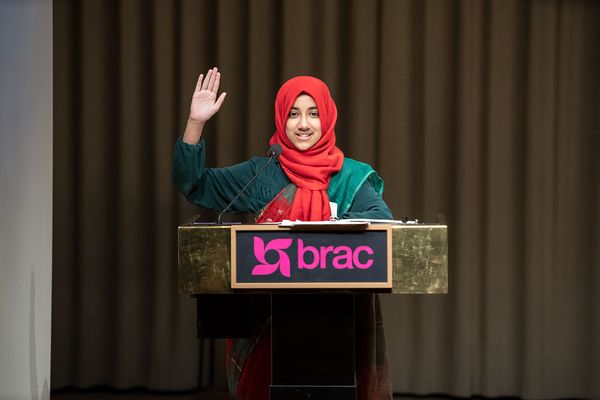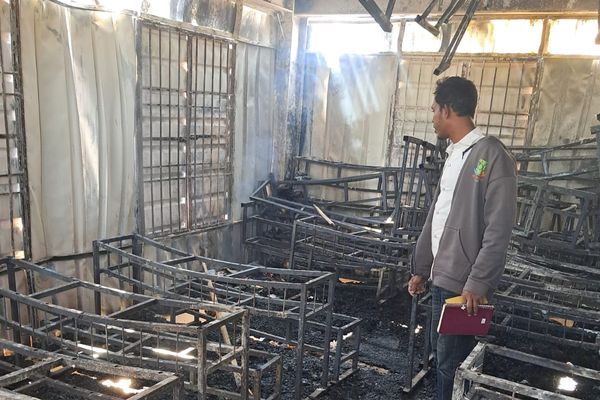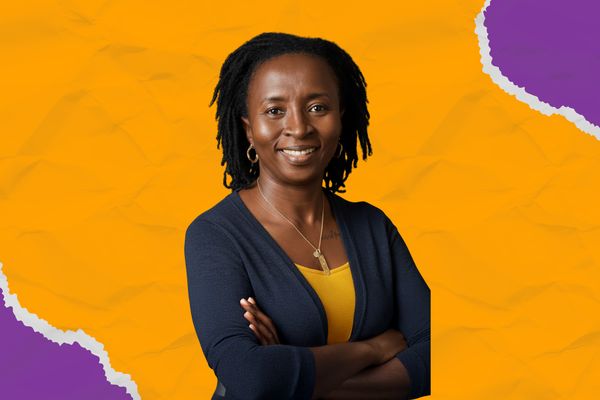BY FAATIHA AAYAT
BRAC USA is thrilled to share a guest blog from Faatiha Aayat, an eleven-year-old Bangladeshi American climate campaigner and child rights activist. On World Day of Social Justice, she shares why climate change is a social justice issue—and explains how climate change threatens health, food security, financial resilience, youth empowerment, and progress for women. Lead photo: Faatiha Aayat speaks at BRAC’s 50th anniversary celebration in New York City. Photo by Ayano Hisa.
Our planet is facing a perilous problem, as temperatures continue to rise, leading to a rapid pace of change. The polar ice caps are melting, causing the sea levels to swell and putting coastal cities and homes at risk. The warmer weather patterns are also causing droughts, which are leading to a decline in crops and a decrease in food production.
This is having a major impact on the world’s population and the economy. The situation is dire, but we have the power to mitigate it by reducing our carbon footprint, protecting our planet, and promoting a future that is pure and pleasant.
The time to pledge and prioritize is now. Let’s protect our planet with purpose and plan, and preserve its peace and pride. Here are five things we need to ponder and take action on as we fight climate change.
Read more: Learn more about BRAC’s work to fight climate change in the most vulnerable communities.
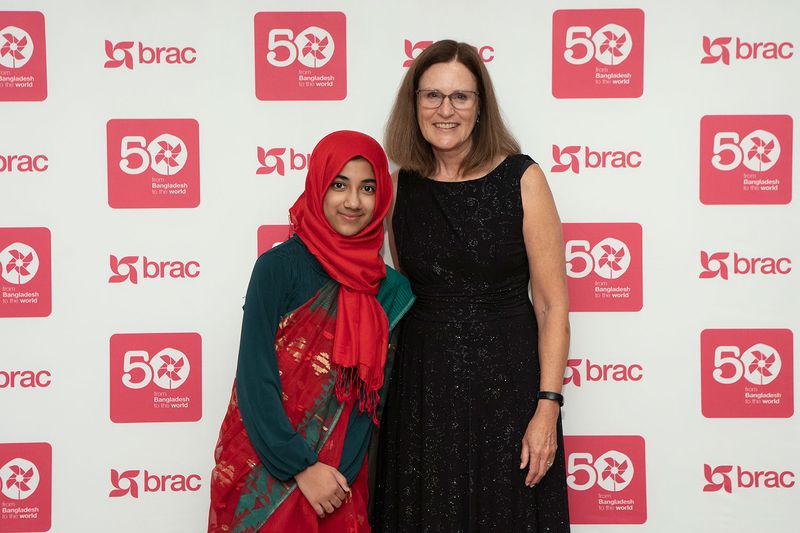 Faatiha poses with Donella Rapier, President and CEO of BRAC USA, at BRAC’s 50th anniversary celebration in New York City in September 2022. Photo by Ayano Hisa.
Faatiha poses with Donella Rapier, President and CEO of BRAC USA, at BRAC’s 50th anniversary celebration in New York City in September 2022. Photo by Ayano Hisa.
1. Climate change threatens health
Climate change can threaten health in several ways. Extreme weather events such as heatwaves, hurricanes, and droughts can cause physical harm and death. Changes in temperature and precipitation patterns can increase the transmission of infectious diseases by insects and pests. Air pollution caused by burning fossil fuels can worsen respiratory and cardiovascular health. Natural disasters such as floods and hurricanes can cause mental health problems, such as post-traumatic stress disorder. Climate change can also negatively impact food security, leading to malnutrition and its associated health problems.
2. Climate change threatens financial resilience
Climate change can threaten financial resilience in several ways. It causes physical damage to property and infrastructure from extreme weather events and sea-level rise. It leads to increased costs for insurance, food, and energy. It disrupts supply chains and trade, affecting global and local economies. Climate change is also causing challenges for industries relying on natural resources, such as agriculture and fishing. This leads to financial losses due to declining productivity, which causes lower worker morale, and increased absenteeism. In the countries worst affected by climate change, reduced investments are being made, leading to decreased economic growth. All of these issues impact the financial resilience of people living in poverty the most.
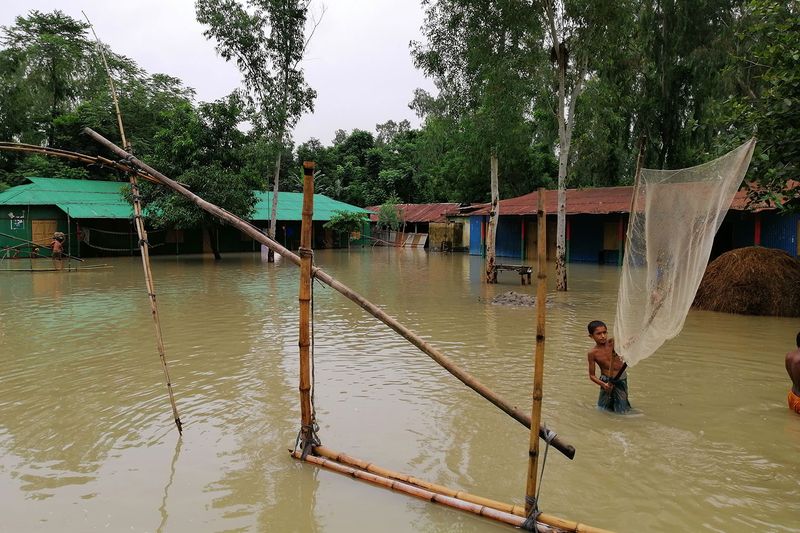 Climate change has caused unpredictable weather patterns around the world, including in flood-prone Bangladesh.
Climate change has caused unpredictable weather patterns around the world, including in flood-prone Bangladesh.
3. Climate change threatens food security
Climate change can threaten food security in several ways. Changes in temperature and precipitation patterns can reduce crop yields and alter the distribution of suitable growing regions. Increased frequency and intensity of extreme weather events can damage crops and infrastructure. Rise in sea levels can lead to saltwater intrusion and loss of fertile land. Changes in temperature and rainfall patterns can increase the spread of pests and diseases, affecting crops and livestock. Disruptions to food systems, such as droughts, hurricanes, and heatwaves, can limit access to food and raise food prices. Climate change can also negatively impact fishing, as ocean acidification and rising water temperatures disrupt marine ecosystems. All of these issues limit food supply and raise food prices, hitting people living in poverty the hardest.
4. Climate change threatens young people
Climate change can threaten young people in several ways. In addition to health impacts from extreme weather events, air pollution, and infectious diseases, climate change can cause disruptions to education due to natural disasters and declining school infrastructure. For young people looking for work, there are reduced job opportunities in industries affected by climate change. Many young people also face negative impacts on their mental health from exposure to environmental stressors at a young age and the loss of community and cultural identity. There is inequality in the distribution of climate change’s impacts, with marginalized communities and young people disproportionately affected. Young people face generational injustice as they will bear the brunt of future impacts of climate change.
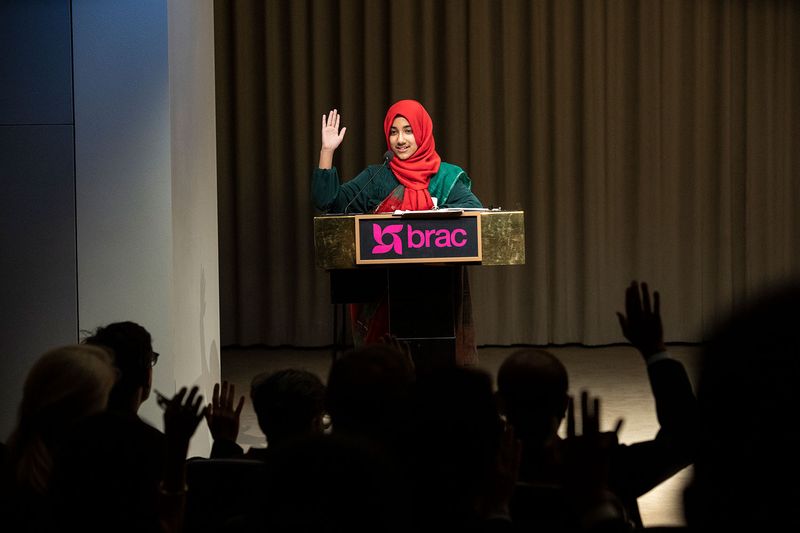 Faatiha issues a powerful call to action at BRAC’s 50th anniversary celebration in New York: “Defeat poverty, defend the planet, and demand equity.” Photo by Ayano Hisa.
Faatiha issues a powerful call to action at BRAC’s 50th anniversary celebration in New York: “Defeat poverty, defend the planet, and demand equity.” Photo by Ayano Hisa.
5. Climate change threatens women
Climate change can have a disproportionate impact on women. Around the world, women often bear the responsibility for household chores such as collecting water and fuel, tasks that can become more difficult and increase their workload due to climate change. Women also face increased health risks: they are more vulnerable to disease and malnutrition due to declining food security. Natural disasters and displacement can increase the risk of violence against women. Women are often employed in industries vulnerable to climate change, such as agriculture, leading to reduced economic opportunities. Women are often underrepresented in decision-making positions, leading to their perspectives and needs not being considered in climate policy. There are many gender-specific impacts of climate change, as climate change has different impacts on men and women due to differences in roles, responsibilities, and access to resources.
Climate change is already having dire impacts around the world, particularly for people living in poverty. On World Day of Social Justice, we must remember that climate change is a social justice issue. Please protect our planet with purpose and plan and preserve its potential with peace and pride.
Read more: Learn why BRAC is prioritizing locally-led climate solutions.
Faatiha Aayat is an eleven-year-old Bangladeshi American child rights activist and climate campaigner and the Founder and CEO of CHIL&D.
